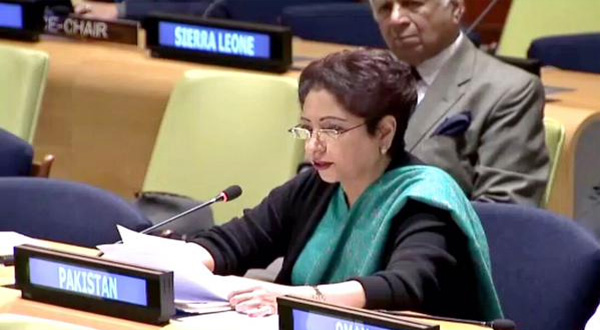UNITED NATIONS: Pakistan would continue cooperating with efforts to promote “fair and equitable” solutions to disarmament and nuclear non-proliferation challenges, a top Pakistani diplomat has said, while working to prevent proliferation of Weapons of Mass Destruction (WMDs) to states as well as non-state actors.
At formal open consultations on the “2016 Comprehensive Review of the implementation of Security Council resolution 1540 (2004),” which aims to prevent the proliferation of weapons of mass destruction to non-State actors, Ambassador Maleeha Lodhi said that Pakistan had made “remarkable progress” towards the resolution’s implementation, and outlined legislative, regulatory, administrative and organizational steps taken in that regard.
The review took place at a three-day meeting of 15-member Council’s so-called 1540 Committee, which was established to facilitate implementation of the resolution by all States. Attending the meeting were UN member states, as well as international, regional and sub-regional organizations and non-governmental organizations.
“The good news is that resolution 1540 has made a useful contribution to the advancement of non-proliferation goals,” the Pakistani envoy told the 1540 Committee.
At the same time, Ambassador Lodhi said, the resolution’s success owes less to the Council’s Chapter-VII (enforcement) provisions than to the cooperative approach it has engendered to promote its implementation.
“Unfortunately,” she said, “other aspects of the non-proliferation landscape do not present an optimistic picture,’ noting that the trends were mostly negative as long-held non-proliferation norms and rules had been and were being undermined in the pursuit of narrow strategic, political and commercial interests.
“As disarmament and non-proliferation are organically linked, lack of progress in fulfilling legal nuclear disarmament obligations has negatively impacted the efficacy of non-proliferation.
Pakistan, she said, fully supported the globally agreed objectives of promoting nuclear non-nuclear proliferation and disarmament. “We also share the concerns about proliferation of Weapons of Mass Destruction (WMDs) and their means of delivery by non-state actors.”
Ambassador Lodhi lauded the progress made in the area of national implementation, assistance, cooperation with international, regional and sub-regional organizations (IROs) and outreach, but also noted several areas that need more attention such as reporting frequency, visits to States, National Action Plans and potential change in the 1540 architecture.
“While it is encouraging to note an increase of 7% in global implementation of the resolution, it is also apparent that many States continue to lack the necessary expertise and resources for full implementation of the resolution,” the Pakistani envoy said, noting vast differences in member states’ economic, industrial, legal and financial profiles.
The Pakistani envoy also spoke of a wide gap between promises and provision of assistance required, especially by developing states. An additional problem was reporting “fatigue”, including for those States, which have filed implementation reports.
The Committee must stay focused on its core mandate i.e. prevention of WMD proliferation by non-state actors, Ambassador Lodhi said.
As regards Pakistan, Ambassador Lodhi said, its nuclear regime has four pillars:
— A well-defined, robust command and control system which exercises control over all aspects of nuclear policy. Technical solutions such as Personnel Reliability Programme (PRP), and intelligence capabilities to deal with nuclear security, non-proliferation, accidents and WMD terrorism had been instituted.
— A rigorous regulatory regime covering all matters related to nuclear safety and security, including physical protection of materials and facilities, material control and accounting, transport security, prevention of illicit trafficking and border controls;
— A comprehensive export control regime, with export control laws at par with international standards;
— International cooperation, consistent with our national policies and interests as well as international obligations.
“We are focused specially on capacity building and interaction with the international community particularly the IAEA,” the Pakistani envoy said, adding that a Centre of Excellence for Training which conducts specialized courses in nuclear security, physical protection and personnel liability had been established.
“We are deploying Special Nuclear Material (SNM) Portals at key entry/exit points to detect, deter and prevent illicit trafficking of radioactive materials,” she told delegates. A Nuclear Security Action Plan, in cooperation with the IAEA, was being implemented and that a strong nuclear emergency response mechanism had been developed.
Opening the discussions, Secretary-General Ban Ki-moon called for intensification of efforts to prevent the proliferation of weapons of mass destruction in order to keep up with and effectively address global challenges.
“I count on the international community to urgently step up its efforts on disarmament and non-proliferation of all kinds of weapons of mass destruction,” the Secretary-General said.
“Let us redouble our efforts to create a safer and more secure world,” he added.





